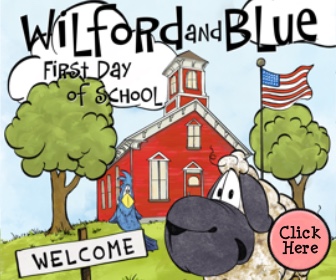Uncle Giles’ Paint Brush By Mary Joanna Porter is a short story for kids with a moral that teaches children about life preparation.
It was a rainy day in summer. A chilly wind swept about the house and bent the branches of the trees, and reminded every one who encountered it that autumn, with its gales, would return as promptly as ever.
A bright fire was blazing in the sitting-room, and near it were Mrs. Strong with her two little girls, and also Aunt Martha Bates, whom they were visiting. Rufus Strong, aged fourteen, stood by a closed window, listlessly drumming on a pane.
He was tired of reading, and tired of watching the ladies sew, and tired of building toy houses for his sisters.
“I guess I’ll go out to the barn and find Uncle Giles,” said he at length.
Mrs. Strong, who had found the music on the window pane rather monotonous, quickly responded in favor of the plan.
“Just the one I want to see!” exclaimed Uncle Giles, as Rufus made his appearance at the barn door. “I’m getting my tools in order, and now you can turn the grind-stone while I sharpen this scythe.”
Rufus cheerfully agreed to this proposal, and performed his part with a hearty good will.
“Do you always put your tools in order on rainy days?” he asked.
“Well, yes; I always look over them and see if they need attention. Then when I want them they are ready for use. Now, since this job is done, suppose you undertake another. Wouldn’t this be a good time to paint those boxes for Aunt Martha’s flowers? You know you promised to paint them for her, and if you do it now, they’ll be good and dry when she wants to pot her plants in September?”
“I think you believe in preparing for work beforehand, don’t you, Uncle Giles?”
“Yes, indeed, that I do. It saves ever so much time when you have any work to do to have things all ready. What’s the matter, can’t you find the paint brush?”
“No, Uncle, and I’m sure that I saw it in its place not very long ago.”
This reminded Uncle Giles that neighbor Jones had borrowed the brush a few days previous and had not yet returned it.
“He promised to bring it home that day,” said Mr. Bates, “but he’s not apt to do things promptly. I guess you’ll have to step over to his house and ask him if he’s through with it.”
Rufus started off on the errand and soon, returned carrying the brush in a small tin pail, half-full of water.
“Mr. Jones is much obliged to you for the use of it,” he said to his uncle, “and he’s sorry that he hasn’t had time to wash out the brush.”
Mr. Bates looked rather annoyed. Accustomed to perfect order himself, he was often irritated by the slovenly ways of his neighbor.
“Then there’s nothing for you to do but repair damages as well as you can. What color of paint is in the brush?”
“Red, sir.”
“And you want to use green. You’ll have to go to the house and get some warm soap-suds and give the brush a thorough washing.”
Rufus found that he had plenty of occupation for some time after that. The brush was soaked up to the handle in the bright red paint, and it was a work of patience to give it the necessary cleaning. Indeed, dinner time found him just ready to begin the task which might have been easily accomplished in the morning had it not been for that long delay.
After dinner he and Uncle Giles again repaired to the barn, where the elder cleaned harness while the younger painted.
“I think I begin to realize,” said Rufus, “that your plan of having tools ready is a good one.”
“Yes, it’s good, no matter what sort of work you’re going to do. I believe you wish to be a minister one of these days, don’t you, Rufus?”
“Yes, I think so now, Uncle.”
“Then you are getting some of your tools ready when you are studying Latin and history and other things in school. And you are getting others ready when you read the Bible, and when you study your Sunday-school lesson, and when you listen to the preaching of your minister. You need to take pains to remember what you learn in these ways, for the good things in your memory will be the tools that you will have constant use for.
“I know a young man who is now studying for the ministry. I think he will succeed, for he is very much in earnest and he has natural ability, too. Yet he finds his task rather difficult, because he had no opportunity to study when he was younger. He has not been trained to think or to remember, and the work he is doing now is something like your washing the paint brush this morning. It must all be done before he can go on to anything better, and he regrets that it was not done at the proper time.”
“I suppose that the moral for me is to improve my privileges.”
“Yes, that’s just it. Improve your privileges by getting ready beforehand for the work of life. If the paint brush teaches you this lesson, you may be glad that you had to stop to get it clean.”



